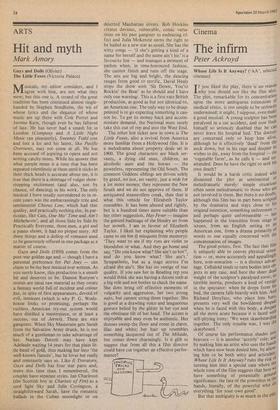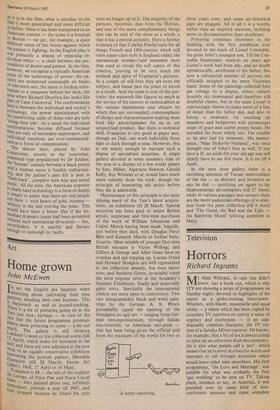Cinema
The infirm
Peter Ackroyd
If you liked the play, there is no reason why you should not like the film also. The plot, remarkable for its concentration upon the more ambiguous extensions of medical ethics, is too simple to be seriotislY undermined; it might, I suppose, even make a good musical. A young sculptor has been paralysed in a bar accident, and now finds himself so seriously disabled that he can never leave his hospital bed. The doctors are concerned only to keep him alive, although he is effectively 'dead' from the neck down, but in his rage and despair he wishes to die, away from the hospital — the `vegetable farm', as he calls it — and tin: attended. Does he have the right to seek his own death?
It would be a harsh critic indeed who dismissed the plot as sentimental or melodramatic merely: simple situations often seem melodramatic to those who are not involved in them. But there is no doubt, although this film has in part been scripted by the dramatist and stays close to his original intention, something unforeseen and perhaps quite unforeseeable — has happened in the transition from stage to screen, from an English setting to an American one, from a drama primarily of words to one equally concerned with the concatenation of images. The good points, first. The fact that filth is uniquely able to convey physical sensa- tion — or, more accurately and appallingly here, non-sensation — is a distinct advary tage. Celluloid tends to turn bodies into oh' jects in any case, and here the sheer dead weight of the sculptor's paralysed torso, its terrible inertia, produces a kind of vertig0 in the spectator: when he drops from his, bed, the camera falls heavily with him. And Richard Dreyfuss, who plays him here, presents very well the bewildered despair when he is faced with this body, a despair all the more acute because it is laced with self-pitying irony: 'We went skateboarding together. The only trouble was, I was the
skateboard.' •
Of course his performance shades int°, bravura — it is another `actorly' role; and making him an artist who uses the hallos which have now been denied him, by allow" ing him to be both witty and articulate; Whose Life Is It Anyway? runs the risk or turning him into a special case where the whole tone of the film suggests that here we have something of potentially general significance: the fate of the powerless in the hands, literally, of the powerful who d° everything 'for your own good'.
But that ambiguity is as much in the play
as it is in the film; what is peculiar to the film is more generalised and more difficult to define. Since it has been transposed to an American context — the scene is a hospital in Boston — we get, for example, a quite different sense of the forces against which the patient is fighting. In the English play it Was primarily a drama of opposing in- dividual ethics — a clash between the per- sonalities of doctor and patient. In the film, however, we recognise a typically American sense of the technology of power: the pa- tients are monitored continually on banks of television sets; the nurse is feeding infor- mation to a computer behind her desk; the area where Richard Dreyfuss lies looks like Part of Cape Canaveral. The confrontation here is between the individual and society's technology, the power administered with the comforting smile of those who are only doing their job'. As a result the individual Confrontations become diffused because they are only of secondary importance, and individual emotions are over-sentimental- ised as a form of compensation. The doctor here, played by John Cassavettes, reverts to the stentorian, Polemical type popularised by Dr Kildare, the 'human,
comedy between a black porter
a, nd a student nurse is frankly embarrass- ing, and the patient's past life is seen in flash-back', complete with mist and mood Music. All the time, the American response to death (and technology is a form of death) is simply to assert that there are real people out there — with hearts of gold, etcetera without in the end proving the point. This would have been a better film if the im- mediate dramatic issues had been presented without such sentimental diversions — but, nevertheless, it is careful and literate enough to outweigh its faults.



































 Previous page
Previous page